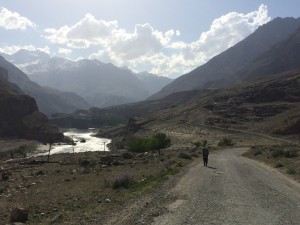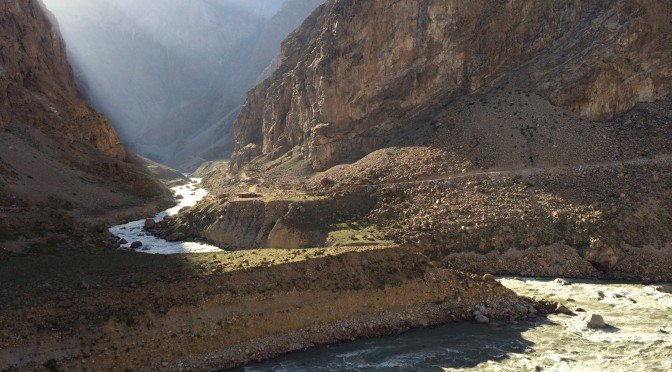We trudge forward. Hours drag on.
Each step brings us to another curve leading to a long stretch of alpine nothingness. It’s just us alone in the world, heads down and walking different paces alongside the Panj River that sometimes meanders a few meters below or rages through narrow gorges.
There’s comfort in solitude. There’s unity between the human spirit and the natural world. There’s also a simultaneous sense of bigness and smallness, being a speck in the shadow of mountainous greatness while having a heart large enough to notice the smallest rock sparkling in the sunshine.
It’s easy to get lost in these long stretches in between Pamir towns. The monotony invites a meditative calm, a peace that comes with moving at about three kilometers an hour. It often, too, stirs restlessness and a string of unconnected thoughts anxious for answers or impatience from feeling like we are going nowhere fast.
States of Being
My mind and body swing between states of being, starting somewhere around gratitude, wonder, strength and analysis and looping through distraction, frustration, vulnerability and exhaustion. Sometimes, they melt into one another over the course of the day or they surge and vanish within the same minute.
They frequently show up and fluctuate like this:
Gratitude: “Look at where we are!!! How did I get to be so lucky to here??! All my life choices have lead me here. Thank you for whatever gave me the courage to come here, for finding someone to share this with, and to everyone who helped me reach this point so far.”
Wonder: “Every time I turn around, there’s something else to see. It’s nothing, and it’s everything.”
Strength: “Be water. Keep pushing through, over the rocks and around the bend, come what may. You choose to be here, and you are tough enough to carry on.”
Analysis: I find myself mulling over global problems, like fair wealth distribution, free education worldwide, gender equality, population control, resources sustainability, and the complete elimination of mosquitos (and flies) and the diseases they spread. The conversation in my head rolls around, weaving through ideas such as, “In the world according to Jenn, every university student would be required to live abroad for one year before receiving a diploma, and we would all learn at least three languages before entering high school, which ever languages would be valuable in that region. How can we make this happen everywhere? Which organization would lead the program? How can be financed?”
Distraction: Like in marathon training and long distance running, my head eventually gets tired of thinking when I’m out walking. During those rough hours, I pull out my MP3 player for a little while, and hum along to Bob Marley, Journey, Maroon Five, Van Morrison, U2 or whatever else comes up on random repeat. I also count and do high math. Thanks to one of the students we met over tea, I’m stuck on an algebra equation: (5x-3)/8 – (3x-1)/10 = 2, and am trying to remember math I learned 30 years ago. (If you feel so inclined, show me your work below in the comments, and help me come up with the right answer. Lluís, a numbers guy, helped me recall the first step and now I’m doing the rest of the calculation.)

Frustration: “What the hell are we doing? This so stupid walking this distance every day. We must be the biggest idiots on the planet. Oh great! Now I get to eat a bucket of dust… Thanks, truck driver…that’s exactly what I need right now. And you freaking flies…STOP LANDING ON MY FACE AND HANDS. Bastards! When is our rest day?? Please, just let this day finish.”
Vulnerability: “What would happen if there was a rock slide right now? Could I jump out of the way fast enough, would an ambulance come fast enough if we were seriously injured? Or what if our backpacks fell into the river, what would we do, what things would we have to replace right away, what would we happen to see float away?”
Exhaustion: “That’s it. I’m done. 28 kilometers checked off. There’s no way to be water right now. My feet are lead, and my legs are collapsing. My hips hurt, my back hurts, and I’m falling asleep standing up. I just want to stop and get inside the tent. No journal, no chit-chatting, just a kiss goodnight and I’m out.”
Small Talk
In between the stretches of being alone, we come across villages. And, in these villages live people who have never seen anyone exactly like us. We are a mystery to them, as much as they are a mystery to us.
School children run down from their classrooms to greet us. Woman in head scarves wave to us from the fields. Men, with shovels slung over their shoulders, throw questions at us. Drivers stop along the road.
We try to satisfy their curiosity, and make small talk wrapping through basic words in Pamir, Tajik, Russian and English (spelled here as they phonetically sound because we can’t access an online translator to correct the words).
“Mashina? Taxi?,” is usually the first question. People walk with their cows, but they don’t walk with backpacks. Driving is the obvious way to go from Langar to Dushanbe. “Mashina? Car?”
“Ne. Pioda,” we answer in the negative. We walk. Yes, really, no mashina, no taxi, no car. Walking.
“Pioda? Pjescom??? Walking, yes?” They shake their heads as if they didn’t hear us right.
“O. Da. Yes. Walking. Kharasho. Zur. Good.,” we say giving a thumbs up.
Then comes the confusing question. “Velosiped? Velik? Bicycle?” They move their hands mimicking the pedaling motion.
It’s encouraging to think that cycling through Central Asia is such a normal thing that locals believe all tourists visit their country on two wheels loaded up with bags hanging over the sides of the frame. But, we’re perplexed. If we are not on our bicycles or pushing up through sand uphill, where do you think our bicycles would be??? In our backpacks???
“No bicycle. Walking. Pioda.” We reply. More head shaking.
More questions follow.
“Atkuda? Francia? Alemania? Where are you from? France? German? What is your name? How are you? How old are you? Are you married? How many kids do you have?”
I get that they are excited about having a chance to meet and talk to us. We are weirdos walking in their town, and it’s not every day something like us happens. In the mornings, I have more energy to answer the string of questions, but by late afternoon, I dread the small talk. I often think of Zuzanna in these moments, a backpacker we met in Osh and traveled with to Murghab. “In Poland, we don’t do small talk. When we ask ‘How are you?’ it’s because we really want to know how you are. We don’t ask, and then just say ‘I’m fine.'”
I manage through the name and how are you questions hurled at me with patience and grace. But, I struggle a lot with the where are you from and the kids stuff. The questions are too small for me, so counter-intuitive to my equal one-world mindset, and any answer I give will be out of context and relatively meaningless for the person asking.
How do I answer where am I from? I can’t. I grew up in one country, and lived on its two very different coasts for long periods of time. I travel on two passports, and I have resided for years in a place not related to either of the two countries that identify me. I don’t fit the stereotype they saw on TV for any of the places where I could be from. I’m from where my mother happened to be when her water broke. I have lived in several other places I chose to be in. Today, I’m homeless. I’m from everywhere, and I’m from nowhere. On a trip like this, I’m from the village I slept in last night and I’m from the village I’m going to now. I’m from Earth. But that’s never a good enough answer.
On normal backpacking trips, I entertain myself and answer,”Fiji.” Yeah, Fiji. If I have to be from some place, being from a island nation in the middle of the Pacific Ocean sounds as good as any other place. This usually stops the pigeon-holing of identity people so desperately want to do. No one knows anything about Fiji, and they can’ they peg me one way or another. (Thanks, Fiji, for letting me be an honorary citizen when I’m on the road.)
Lately, though, I just say Europe. It’s true – that’s where my stuff still is, that’s where I will most likely return after this walk. Still, that doesn’t fit me quite right either. I usually leave the rest of the explanation about Catalonia to Lluís, who is definitive in stating his nationality and wants to educate people about his homeland.
How many kids do I have? This question makes my blood boil. What does it matter to you? How can this be the only common thread you can find between us…That my worth is measured by my child-bearing ability, that I am woman enough only if I have kids. When I say we have no kids, none, all the ladies stare at me in utter disbelief. How could I have no kids??? One day, Lluís, equally fed up with this question, answered, “We have five kids. 13, 12, 5, 3 and 2.” Everyone here seems to have four, five or six kids, and a majority of the families we have met have adult children working in Moscow because they need the money to support these large families.
The guy Lluís told this too began hooting and hollering, shaking Lluís’ hand and congratulating him for his manliness and stamina. Me – the alleged mother who bore all these fake children – I barely got a smile tossed in my direction. So I’m damned if we say we don’t have kids, and I’m cast aside if we say we do.
But even in all this gibberish, how could I possible put words around my choice to be child-free at 44 years old? How could I explain that when I was 20-something I thought having kids was part my life path, something wished and imposed on me by society, but that now I am very happy with the life I created without them and have no regrets about that choice? The people asking these questions have no understanding about the context of the many steps it took me to get here, to this point in life at this moment in time. There’s no frame of reference for me in their everyday existence of what they know to be true.
In the end, it doesn’t matter. Being lost long enough in the lonely stretches of a long walk make all these questions and different trains of thought insignificant. Our world now is reduced to the basics of finding water, food and a safe place to sleep. We hope the river keeps guiding us ahead and the mountains make our footsteps feel less small.









Thanks for taking time to write. I appreciate how hard that is at the end of your days. You really capture the mind game of your journey in the post.
Very informative and interesting to read travel log. The post is so well written I didn’t need photos, really. Kepp up the good work, I’ll look forward to your next post
Thank you! We finally could publish the pictures, so now you can enjoy them together with 2 new posts.
Thanks much! Go back in and take another look at our recent posts–we were finally able to upload some pictures.